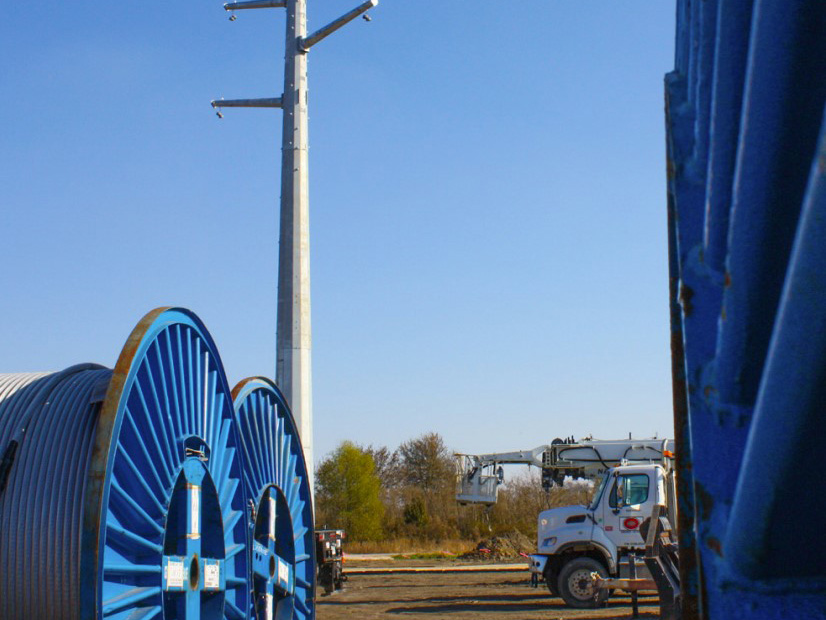MISO has awarded Ameren Transmission Company of Illinois (ATXI) the lead in building a pair of lines and substation in northwest Missouri, the second competitively bid project stemming from the RTO’s $10 billion long-range transmission plan (LRTP).
The Ameren subsidiary plans to partner with the Missouri Joint Municipal Electric Utility Commission on development of the $84 million, 345-kV Fairport-Denny project, extending to the Iowa-Missouri border. ATXI plans to sell 49% of the project to the Missouri state utility agency just before the project is placed in service in 2030.
MISO said ATXI was one of four developers to submit project proposals, with LS Power Midcontinent, NextEra Energy Transmission Midwest and Transource Energy offering nine. MISO does not reveal the companies behind non-winning bids, although it said one developer submitted six proposals based on differing designs. It said proposals ranged from $84 million to $134 million for project implementation. MISO originally estimated the Fairport-Denny project would cost $161 million. The RTO said cost differences between proposals came down to conductor size, substation design and tax liabilities.
Jeremiah Doner, MISO’s director of cost allocation and competitive transmission, said ATXI’s proposal incorporates “strong cost containment and a sound design.” MISO said ATXI pledged annual revenue requirement caps and carefully considered pre-construction studies and proposed routes.
“Ameren’s proposal, submitted with its partner MJMEUC, had a substantially lower cost than that of the next closest proposal, which was 36% higher based on the annual costs to customers over 40 years,” Doner said in a press release.
MISO said ATXI will execute a selected developer agreement. Doner said MISO looks forward to “working closely with the developer, regulators and other stakeholders to support a successful and on-time completion of the project.”
In a press release, ATXI President Shawn Schukar said the project bid was the “result of a collaborative effort with many community partners who have the best interests of our state in mind.”
He said ATXI will continue to solicit input from the community to build affordable transmission projects.
MISO is simultaneously managing multiple RFPs related to the first LRTP portfolio.
The grid operator opened an RFP for another LRTP project in March. It seeks bids on the $556 million Denny to Zachary to Thomas Hill 345 kV project, part of which will link up with the Fairport-Denny project. Proposals are due Nov. 14. (See MISO Begins LRTP’s 2nd RFP Process.)
The half-billion-dollar solicitation is MISO’s most expensive request for proposals.
The grid operator also opened two other RFPs in July: the $12 million Deadend to Tremval 345-kV project in Wisconsin and a $23 million, 345-kV line segment from the Iowa-Illinois border to the Ipava substation in Illinois. It will select developers for the trio of projects over 2024.
In May, MISO selected LS Power’s Republic Transmission to build the $77 million Hiple 345-kV line at the Indiana-Michigan border. It’s MISO’s first competitive project surfacing from the LRTP. (See MISO Picks Republic Transmission for 1st LRTP Competitive Project.)
In MISO, competitive transmission developers must be members and must be prequalified to bid on competitive projects. Developers must include a $20,000 application fee and a $100,000 initial deposit to have their bids considered by MISO.
MISO’s decision to go with ATXI for the LRTP competitive builds comes as a right of first refusal (ROFR) bill for downstate Illinois fizzled out, with supporters last week acknowledging they don’t have enough votes in the Democratic-controlled General Assembly to overrule Gov. J.B. Pritzker’s August veto of the ROFR portion of energy legislation approved in the spring. (See Ill. Gov. Vetoes Downstate ROFR for MISO Regional Tx Projects.)
The bill would have given ATXI exclusive rights to build regional MISO transmission lines in its territory and shut down MISO’s competitive bidding process for future projects in downstate Illinois. ATXI backed the legislation.
Recently, ATXI Chairman and President Leonard Singh wrote in a letter to state lawmakers that the company had been “subjected to well-funded misinformation campaigns by out-of-state developers and special interests” who opposed the ROFR.
Singh said a ROFR would keep transmission projects under state — rather than federal — control and remains “the best option to prevent unnecessary delays in construction and hundreds of millions of dollars in potential cost overruns.”
Rep. Larry Walsh (D-Elwood), who sponsored the original measure, said he would reintroduce even broader legislation in spring that seeks to install a permanent ROFR on transmission projects for all utilities in the state.




